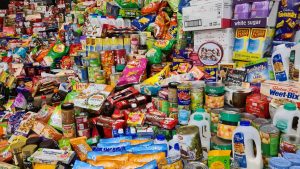In an era where convenience is king, non-perishable foods have become a staple in many households. These long-lasting items not only offer the advantage of a long shelf life, but they can also be a source of essential nutrients. This article will delve into the world of non-perishable foods, highlighting some of the best options for maintaining a balanced diet.
- Whole Grains: A Pantry Powerhouse
Whole grains such as brown rice, quinoa, and oats are excellent non-perishable foods. They are packed with fiber, which aids in digestion and helps maintain a healthy weight. Additionally, they are a good source of B vitamins and minerals like iron, magnesium, and selenium.
- Legumes: The Protein-Rich Staple
Legumes, including lentils, chickpeas, and black beans, are a protein-rich non-perishable food. They are also high in fiber and low in fat, making them a heart-healthy choice. Canned or dried, they can be used in a variety of dishes, from soups and stews to salads and stir-fries.
- Nuts and Seeds: The Healthy Snack
Nuts and seeds are another non-perishable food that packs a nutritional punch. They are high in heart-healthy fats, protein, and fiber. Additionally, they contain a variety of vitamins and minerals, including vitamin E, magnesium, and selenium.
- Canned Fish: A Sea of Nutrients
Canned fish, such as salmon, tuna, and sardines, are a great source of lean protein and omega-3 fatty acids. These essential fats are known for their heart health benefits and their role in brain function.
- Dried Fruits: Nature's Candy
Dried fruits like apricots, raisins, and prunes are a sweet, non-perishable food option. They are high in fiber and various vitamins and minerals. However, they are also high in sugar, so they should be consumed in moderation.
- Powdered Milk: Dairy on Demand
Powdered milk is a versatile non-perishable food. It provides a good source of protein, vitamins A and D, and calcium. It can be used in cooking and baking, or reconstituted with water for a dairy substitute.
- Spices and Herbs: Flavor without the Fuss
Spices and herbs are non-perishable foods that can add flavor without adding extra calories or sodium. They also contain various health-promoting compounds, making them a great addition to any pantry.
In conclusion, non-perishable foods can be a nutritious and convenient part of a balanced diet. By choosing wisely and incorporating a variety of these foods into your meals, you can enjoy the benefits of convenience without sacrificing nutrition.



+ There are no comments
Add yours